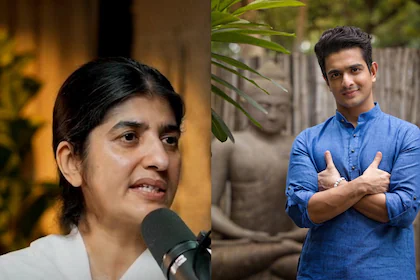BK Shivani’s words of caution to Ranveer Allahbadia about mindful content have resurfaced, sparking renewed discussion about the impact of digital media. The spiritual mentor’s interaction with the YouTuber, which took place in August 2024, gained fresh attention after Allahbadia’s controversial remarks on Samay Raina’s show, India’s Got Latent. The viral clip from their conversation highlights her concerns over the responsibility that content creators bear in shaping the mental and emotional well-being of their audience.
During their discussion, Shivani emphasized that content consumption directly affects mental health, comparing it to food that nourishes or harms the body. She reminded Allahbadia of her earlier warning, stating, “I told you to be careful. It is not just a podcast. We really need to take responsibility.” She explained that just as people prioritize healthy food, content creators should ensure they provide nourishing material for the mind. Her analogy reinforced the idea that media, like diet, plays a crucial role in shaping thoughts, emotions, and overall well-being.
Shivani stressed that positive and mindful content has the potential to uplift people and transform their perspectives, while thoughtless material can negatively impact mental states. She urged creators to be cautious, warning against contributing to the kind of content that could bring people down. Reflecting on the behavioral patterns of younger generations, she pointed out how their consumption of media influences their thoughts and actions. She also highlighted the concept of karma, suggesting that any content that negatively affects someone’s mental state ultimately adds to the creator’s karmic account.
She shared insights from her experience with her TV show Awakening, which first aired in 2007. The program’s 25-minute episodes helped many viewers navigate their challenges with a positive mindset. She recounted instances where individuals avoided divorces and overcame personal struggles simply by consuming uplifting content. The profound impact of media on the human mind, she argued, should never be underestimated. In contrast, she warned that prolonged exposure to negative material could deepen existing issues or even create new problems that did not exist before.
Shivani acknowledged that it is impossible to completely control the type of content that circulates in the digital space. However, she asserted that the responsibility now rests on both content creators and consumers. While producers of media should be mindful of their influence, audiences must also exercise discretion in what they choose to watch or listen to. “We cannot stop the makers. So, at least the listeners and the audience should take care,” she remarked.
The resurfaced conversation comes at a time when discussions around digital responsibility and ethical content creation are growing louder. The controversy surrounding Allahbadia’s remarks has amplified debates about the boundaries of content creation and its potential consequences. Many social media users are revisiting Shivani’s words and reflecting on their relevance in today’s fast-paced digital landscape.
The impact of content on mental health has been widely studied, with psychologists and researchers highlighting the dangers of unchecked media consumption. Exposure to harmful or misleading information can lead to anxiety, stress, and even long-term behavioral changes. Shivani’s views align with growing concerns that social media platforms and digital creators must take greater responsibility for the material they produce.
As more people engage with online content, conversations about the ethical responsibilities of influencers and media personalities continue to evolve. The resurfacing of this interview serves as a reminder that digital creators wield immense power over their audiences. Shivani’s message remains a compelling call to action—one that urges mindfulness, responsibility, and a commitment to using media as a force for good.
Shivani also delved into the subconscious effects of repeated exposure to negative or sensationalized content. She explained that even if people consume such material passively, it gradually conditions their thinking patterns. Over time, this can alter their perception of relationships, self-worth, and decision-making abilities. She urged creators to understand that their words and narratives do not simply vanish after being spoken or uploaded—they settle in the minds of viewers and shape their reality in ways they may not even realize.
She further discussed the psychological impact of the digital age, where algorithms continuously push content based on previous consumption. This creates a cycle where viewers, once exposed to certain types of media, find themselves trapped in a feedback loop of similar content. She expressed concern that many people, particularly young audiences, are unable to break free from this pattern, making it even more important for creators to be responsible with what they put out into the world.
Shivani also emphasized the role of intention behind content creation. She explained that if a creator’s primary motivation is to generate controversy, attract attention, or increase engagement at any cost, it inevitably leads to content that prioritizes shock value over meaningful discourse. In contrast, she urged creators to operate from a space of sincerity, focusing on messages that uplift, educate, and provide real value to the audience.
Reflecting on the changing nature of media consumption, she pointed out that earlier generations had limited access to television or newspapers, making content a regulated and structured part of life. Now, with content available at all times, people are exposed to a continuous influx of information. This unrestricted access, while empowering, also increases the risk of misinformation and emotional distress. She encouraged individuals to set boundaries on their digital consumption and actively choose content that enhances their well-being rather than diminishes it.
As conversations about digital responsibility continue to evolve, Shivani’s insights serve as a timely reminder that the impact of content goes far beyond momentary entertainment. Her caution to Allahbadia reflects a larger truth—content creators, whether they acknowledge it or not, play a role in shaping the emotional and psychological health of society.



